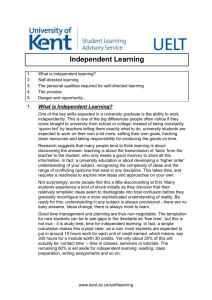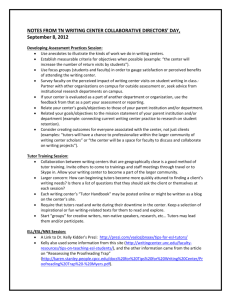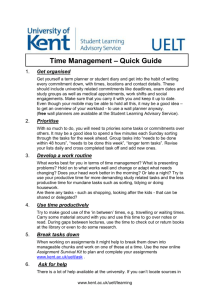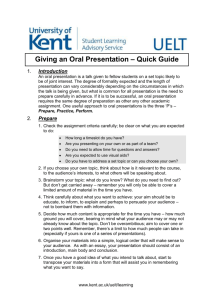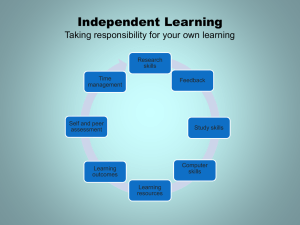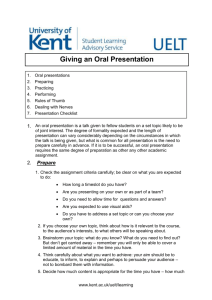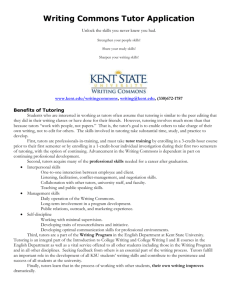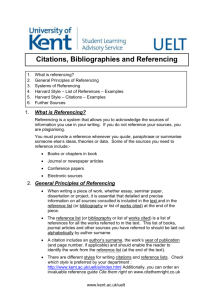Learning from Feedback
advertisement
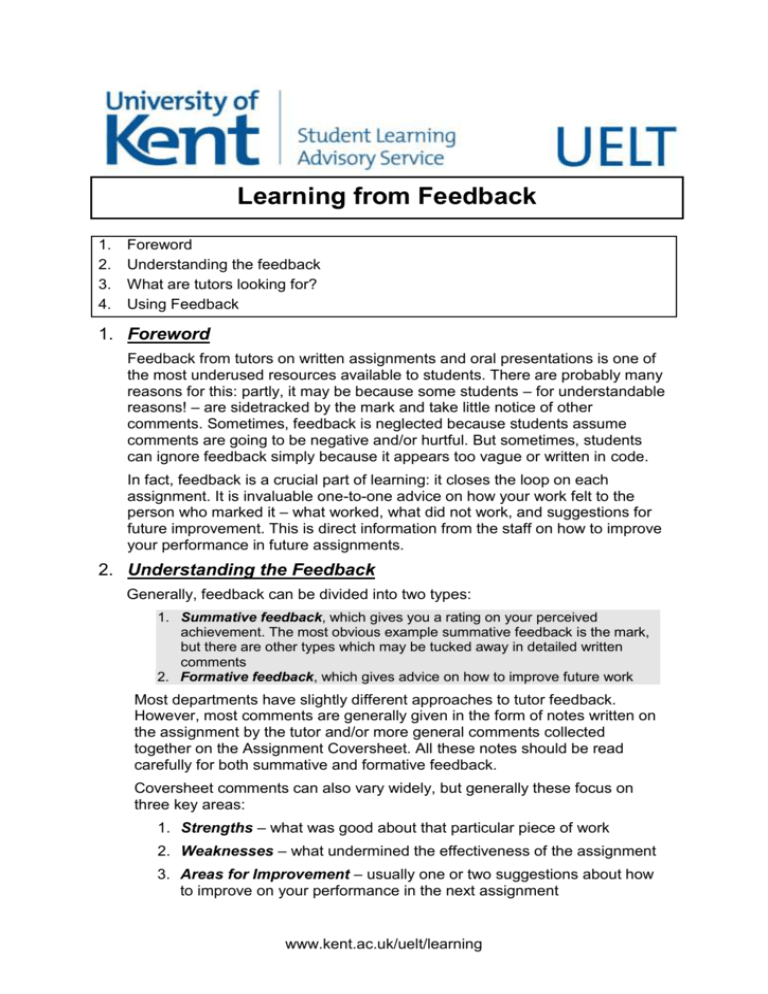
Learning from Feedback 1. 2. 3. 4. Foreword Understanding the feedback What are tutors looking for? Using Feedback 1. Foreword Feedback from tutors on written assignments and oral presentations is one of the most underused resources available to students. There are probably many reasons for this: partly, it may be because some students – for understandable reasons! – are sidetracked by the mark and take little notice of other comments. Sometimes, feedback is neglected because students assume comments are going to be negative and/or hurtful. But sometimes, students can ignore feedback simply because it appears too vague or written in code. In fact, feedback is a crucial part of learning: it closes the loop on each assignment. It is invaluable one-to-one advice on how your work felt to the person who marked it – what worked, what did not work, and suggestions for future improvement. This is direct information from the staff on how to improve your performance in future assignments. 2. Understanding the Feedback Generally, feedback can be divided into two types: 1. Summative feedback, which gives you a rating on your perceived achievement. The most obvious example summative feedback is the mark, but there are other types which may be tucked away in detailed written comments 2. Formative feedback, which gives advice on how to improve future work Most departments have slightly different approaches to tutor feedback. However, most comments are generally given in the form of notes written on the assignment by the tutor and/or more general comments collected together on the Assignment Coversheet. All these notes should be read carefully for both summative and formative feedback. Coversheet comments can also vary widely, but generally these focus on three key areas: 1. Strengths – what was good about that particular piece of work 2. Weaknesses – what undermined the effectiveness of the assignment 3. Areas for Improvement – usually one or two suggestions about how to improve on your performance in the next assignment www.kent.ac.uk/uelt/learning It is sometimes easy to zoom in on the weaknesses and see the other two sections as simple psychological ‘sweeteners’ for the bad news. This is a mistake: all three sections can convey important feedback, and should be considered carefully. Most tutors spend a lot of time trying conscientiously to give helpful comments. Use them! 3. What are Tutors Looking For? As always, academic practice varies enormously, but broadly tutors are looking for four things: 1. Academic content – evidence of appropriate background reading and research coupled with a clear demonstration that you understand and can use these often complex ideas 2. Organisation – the ability to present complex material in a clear and coherent manner which takes the reader systematically and carefully through the evidence 3. Grammar and spelling – or put more simply, effective communication skills 4. Technical academic conventions – from the simple (like giving the word count) through to the detailed referencing and bibliographic conventions appropriate to your subject Again, opinion varies, but generally the first point (academic content) will get you the marks and the last three points will lose you marks if they are not done properly. 4. Using Feedback Emotional Responses: Sometimes, tutor comments can feel unduly negative. Any criticism can feel hurtful, which is why it is important to recognise and acknowledge your feelings so that you can work through them and benefit from even the most negative feedback. If you feel angry or demotivated, confused or upset, be honest; then you can start to deal with the emotions and eventually move on. If you feel particularly upset, it may be important to put the assignment to one side for a day or two, and return later when you are in a more positive frame of mind. Work through the comments and draw up a simple checklist of issues raised by the tutor. This is also a good way of checking that you have fully understood what is being said. If in doubt, contact your tutor for further clarification – all you need to do is either drop them an email or take advantage of the regular office hour most tutors now offer. Typical criticisms of student assignments include: Inadequate background reading and preparation. Poor construction in terms of the structure and argument. Poor grammar and spelling. Inadequate critical analysis of the underlying issues. Poor referencing. Lack of credible scholarly evidence to back up the claims made in the assignment. Make a list of all these suggested areas for improvement. www.kent.ac.uk/uelt/learning Then, prioritise the list: put the most serious issues at the top, with the relatively minor problems at the bottom. You might also like to divide the list into two: Part A would then relate primarily to the academic content – e.g. the need for fuller background reading, or sharper critical analysis of the underlying issues of scholarly debate; Part B would then relate to technical aspects of the assignment – the structure of the argument, grammar and spelling, referencing, and so on. When you have finished the list, try and pinpoint one or two issues (only!) those you think are the most important. Then work at a strategy for doing better with the next assignment – what immediate action can you take to show some improvement in these areas? Remember, you’re far more likely to succeed in the long-term if you adopt an incremental approach – a little bit at a time. You are most unlikely to get everything right all in one go! Think in terms of a slightly longer timeframe so that your work gradually improves as your course progresses. Some of the steps you need to take could be relatively simple and straightforward – like better time management so you can spend more time on reading and preparation. Other issues may require more careful planning – for example, problems with English Language and/or grammar or spelling are unlikely to be resolved overnight. Think about an intelligent strategy for getting help – there really is no merit in ignoring the problem because you might feel a bit embarrassed. The most likely outcome of doing nothing is that you will simply repeat the same mistakes. Even the most experienced academics need help sometimes, and there is no shame in asking. Remember, all the additional resources available through the Student Learning Advisory Service (SLAS). SLAS has a wealth of information in the form of printed leaflets and on the SLAS website (www.kent.ac.uk/uelt/learning/index.html), where you can also find details of the regular Workshops both at Canterbury and Medway. These workshops cover most of the issues commonly raised in feedback from tutors, and provide an open and friendly environment for exploring all of these questions. Plan now to attend those workshops which deal with the issues at the top of your list of priorities for improvement. Above all, please do not suffer in silence: ask your tutor, talk things through with your friends on the course, use SLAS, and get help if and when it is needed. Feedback from assignments is an essential ingredient in academic growth and development. Please use it! www.kent.ac.uk/uelt/learning

